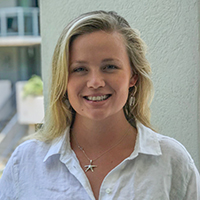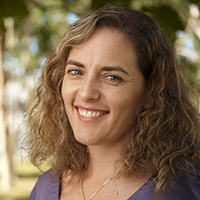Fast Facts
Location
Commencing
- Townsville: February, July
- Cairns: February, July
Fees
$8,948.00+
$33,741.00^
+estimated annual Commonwealth Supported Fee for a full-time study load
^estimated annual tuition fee for a full-time study load
Plus Student Services and Amenities fee
Fee deferral and scholarships available if eligible
Duration
2 years full-time
Entry Requirements
AQF Level 7 bachelor degree in science with minimum GPA of 5.0; or equivalent
Course Code
115804
Course detail
In this flexible, 2-year full-time course, you will complete advanced coursework subjects and then undertake your own independent research project or choose to apply your skills in an industry-based project. The research project is a pathway towards a PhD by research program.
Master of Science (Professional) graduates are well equipped to evaluate global environmental challenges and driven to design innovative, sustainable and holistic solutions.
Choose one of seven majors and take specialised elective subjects from the same discipline or broaden your skills with subjects from complementary disciplines.
View the handbook for a detailed overview of available majors and subjects.
Inherent requirements
Inherent requirements are the identified abilities, attributes, skills, and behaviours that must be demonstrated, during the learning experience, to successfully complete a course. These abilities, attributes, skills, and behaviours preserve the academic integrity of the University’s learning, assessment, and accreditation processes, and where applicable, meet the standards of a profession. For more information please review the inherent requirements for the Master of Science (Professional).
Majors
Students choose from seven majors and can select elective subjects within the same major or from another discipline to enhance their learning.
Cairns campus only offers the Environmental Earth Science, Global Change Biology, and Tropical Biology and Conservation majors. All programs are available at the Townsville campus
Aquaculture Science and Technology
Students benefit from staff members who are world-leaders in tropical aquaculture research, and a combination of theoretical and hands-on learning. You’ll sharpen your skills in JCU’s Marine and Aquaculture Research Facility, the largest university research aquarium facilities in Australia. You will explore the science behind the innovative and sustainable commercial production of aquatic species.
Gain knowledge and skills on scientific, technological and practical applications of breeding and rearing of aquatic organisms for food, aquarium, pearl and pharmaceutical applications. Through course work with field trips, and unique hands-on Hatchery Technique subject, you will understand how diverse species are farmed and the science and biotechnology approaches to enhance production including physiology, nutrition, genetic selection and disease management.
Our researchers’ strong links to industry will give you a sound professional network and a wide range of career opportunities when you graduate.
Environmental Earth Science
Learn about the impacts of land use, land management, and climate change on the Earth’s surface, about present and future environmental challenges facing modern society, and how applied science is helping to solve these problems.
Gain specialised skills in assessing land and water condition and apply your learnings to the diverse environments of the tropics, including tropical rainforests, fertile agricultural regions, the vast savannah outback, magnificent tropical rivers, diverse coastlines, and various other field areas in North Queensland, Australia and beyond.
Environmental Management
Reap the benefits of hands-on fieldwork experience to develop your capability in natural resource management. Work with research and industry experts and deepen your understanding of how natural environments function and change over time and how to manage them.
Gain specialised technical skills in remote sensing, Geographic Information Systems, and Environmental and Social Impact Assessment. Become an expert in the interconnected ecological and social aspects of managing complex ecosystems.
Fisheries Science and Management
Explore the fundamentals of fisheries science and its application in tropical environments. Gain knowledge, technical skills and experience in fisheries assessments, sustainable development and management approaches.
Tackle the grand challenges in fisheries across small scale and industrial contexts, to ensure the best possible outcomes for human communities, fish stocks, and ecosystems globally. Continue your studies with a research project supervised by one of our world experts in fisheries or apply your learnings with one of our industry partners in fishery management.
Geology
Develop your knowledge of geological structures, mineralogy, plate tectonics and geochemistry, as well as the field, instrumental and analytical techniques used to conduct research in these areas. Benefit from practical experience studying minerals, rocks and sediments — and their chemical make-up — in research contexts including the Great Artesian Basin, the Outback, the Great Barrier Reef Marine Park, and other coastal and terrestrial environments.
Learn about feasible and sustainable ways to explore for and extract strategic/critical resources, and evaluate geological natural hazards that may threaten communities.
Global Change Biology
Develop the technical skills and knowledge necessary for environmental conservation, research and analysis in a rapidly changing world.
Gain in-depth knowledge of global changes, patterns of biodiversity, conservation planning and evolutionary adaptation and be equipped to address the threats and challenges to global biodiversity. Learn how to identify major issues impacting species and ecosystems, analyse the contributing factors and formulate methods of solving some of our world's biggest problems.
With the natural environment changing at an unprecedented rate, it has never been more important to understand and reduce the accelerating impacts on our ecosystems.
Tropical Biology and Conservation
Benefit from access to natural environments in close proximity to JCU campuses, including savannahs, the World Heritage Daintree Rainforest, and coastal marine habitats. Your studies will integrate a range of disciplines such as zoology, ecology, botany, and behaviour and evolution biology across an array terrestrial and marine habitats.
Observe, explore and build your understanding of the diversity of the biological world while developing the skills necessary to conduct applied research and/or work in environmental science industries delivering innovative and sustainable solutions for conserving the natural environment. Continue your studies with a research project supervised by one of our world experts or apply your learnings with one of our industry partners.
View the handbook for detailed subject information.
Advance your scientific career with a professional postgraduate course. JCU Master of Science graduates are highly regarded and find employment in a range of organisations within Australia and around the world.
You could pursue your specialised scientific field in the public or private sector, working for business, government, educational, research or not-for-profit agencies.
As a Master of Science (Professional) graduate, you may find yourself holding positions such as biologist, ecologist, conservation agent, environmental manager/specialist, or within academy as a researcher and/or teacher within these fields. This course is also a pathway towards a Doctor of Philosophy (PhD).
Handbook year | Information valid for students commencing in 2024. |
Course code | 115804 |
Course type | Masters Degree (Coursework) (AQF Level 9) |
Owner | Academy |
College | Science and Engineering |
Award Requirements
Admission Requirements
Course pre-requisites | Completion of an AQF level 7 bachelor degree in science with a minimum GPA of 5.0 (65%) or equivalent. Entry requirements for this course are consistent with the Pathways to Qualifications in the Australian Qualifications Framework (AQF level 9) Guidelines for Masters degrees. |
Minimum English language proficiency requirements | Applicants of non-English speaking backgrounds must meet the English language proficiency requirements of Band 1 – Schedule II of the JCU Admissions Policy. |
Post Admission requirements | Some majors require attendance in intensive mode subjects on either the Townsville or Cairns campus. Students may be required to attend intensive mode classes at a campus other than that at which they are enrolled, at their own expense. Global Change Biology major: A student enrolled in this major will be required to undertake mandatory field trips (or trip) for which they will have to pay an additional fee not included in the course tuition fees. |
Academic Requirements for Course Completion
Credit points | 48 credit points as per course structure |
Course learning outcomes | On successful completion of the Master of Science (Professional), graduates will be able to:
|
Inherent Requirements
Inherent Requirements | Inherent requirements are the identified abilities, attributes, skills, and behaviours that must be demonstrated, during the learning experience, to successfully complete a course. These abilities, attributes, skills, and behaviours preserve the academic integrity of the University's learning, assessment, and accreditation processes, and where applicable, meet the standards of a profession. For more information please visit: Master of Science (Professional). |
Reasonable adjustments | All JCU students have the opportunity to demonstrate, with reasonable adjustments where applicable, the inherent requirements for their course. For more information please visit: Student Disability Policy and Procedure. |
Course Structure
OPTIONS
Select a major from Table A
PLUS
Select Option 1 or 2
Option 1 – Research Stream
To be eligible for this stream, students must attain a GPA of 5.5 or above from their preceding 24 credit points of JCU level 5 subjects, or approval of the Course Coordinator
SC5912:06 Research Project (Part 1 of 2)
SC5913:06 Research Project (Part 2 of 2)
or
Option 2 – Professional Employability Stream
To be eligible for this stream, students must satisfactorily complete the pre-requisite subject SC5200 Professional Employability and at least 24 credit points of level 5 JCU subjects
SC5009:12 Postgraduate Internship
MAJORS
Credit points in major | 36 credit points |
MAJOR | AVAILABLE AT | NOTES |
JCU Townsville | ||
JCU Cairns JCU Townsville | ||
JCU Townsville | ||
JCU Townsville | ||
JCU Townsville | ||
JCU Cairns JCU Townsville | Additional fees required for mandatory fieldtrip | |
JCU Cairns JCU Townsville |
Location
COURSE AVAILABLE AT | NOTES |
JCU Cairns | Not all majors available at JCU Cairns |
JCU Townsville |
Candidature
Expected time to complete | 2 years full-time or part-time equivalent |
Maximum time to complete | 6 years |
Maximum leave of absence | 2 years |
Progression
Course progression requisites | The Research or Professional Employability stream subjects should not be undertaken until all other subjects are satisfactorily completed. Students who do not meet the GPA requirement for the Research Project option will be required to undertake the Postgraduate Internship. |
Course includes mandatory professional placement(s) | Students admitted to the Master of Science (Professional) do not have a mandatory professional placement however are required to undertake either a Postgraduate Internship or a Research Project as their course capstone option. |
| Course includes mandatory fieldwork | There are mandatory field trip requirements for students undertaking the Global Change Biology major. |
Special assessment requirements | Nil |
Professional accreditation requirements | Nil |
Supplementary exam for final subject | A student who has failed the final subject towards the award and who gained 40% or more of the marks for that subject, may be granted a supplementary examination in that subject. |
Credit
Eligibility | Students may apply for a credit transfer for previous tertiary study or informal and non-formal learning in accordance with the Credit Transfer Procedure. Credit will only be granted for subjects aligned to the current course’s learning outcomes and if the applicant demonstrates sufficient prior knowledge and skills to achieve the course learning outcomes in the time available in the course. Up to 24 credit points may be granted for an AQF Level 8 qualification in a Cognate* Science discipline as determined by the College of Science and Engineering. *Cognate discipline: Studies at a postgraduate level in a discipline that is closely aligned with or related to the major being undertaken. |
Maximum allowed | 24 credit points Where a student transfers from one JCU award to another, then credit may be granted for more than two-thirds of the new award, where there is subject equivalence between the awards. |
Currency | Credit will be granted only for subjects completed in the 10 years prior to the commencement of this course |
Expiry | Credit gained for any subject shall be cancelled 16 years after the date of the examination upon which the credit is based if, by then, the student has not completed this course. |
Other restrictions | Nil |
Award Details
Award title | MASTER OF SCIENCE (PROFESSIONAL) |
Approved abbreviation | MSc (Prof) |
Inclusion of majors on | Majors will appear on the testamur |
Exit with lesser award | Students who exit the course prior to completion, and have successfully completed 36 credit points of appropriate subjects, may be eligible for the award of Master of Science. Students who exit the course prior to completion, and have successfully completed 24 credit points of appropriate subjects, may be eligible for the award of Graduate Diploma of Science. Students who have completed 12 credit points of appropriate subjects may be eligible to exit with the Graduate Certificate of Science. |
Course articulation | Not applicable |
Special Awards | Students may receive an Award of Recognition in accordance with the Recognition of Academic Excellence Procedure |
Estimated annual Commonwealth Supported fee: $AUD8,948.00
Estimated annual tuition fee: $AUD33,741.00
A Student Services and Amenities fee is payable per subject up to a maximum amount per year.
A variety of Scholarships are available to suit different student types.
Complete an online application through our Online Application Portal.
Real stories
-

Student
Jana Birkby
Master Of Science (Professional)
Studying a Master of Science (Professional) at JCU, I feel like I am walking away with much more than a piece of paper, but with genuine hands-on experience and skills to tackle both industry and further academic studies. Diving and living on an island in the Great Barrier Reef for a field trip was pretty amazing.
-

International Student - Indonesia
Arnoldus Ananta
Master of Science (Professional)
JCU has provided an enriching environment that perfectly aligns with my academic and professional goals. Professors are not only experts in their fields, but also genuinely invested in the success of their students. The robust curriculum and outstanding research facilities have enabled me to grow as a scientist.
-

International Student - India
Taruna Venkatachalam
Master of Science (Professional)
I chose the Professional program so I could take advantage of the 12-credit research/placement option. Having always wanted to study wildlife sciences, I really wanted to get into research, to help myself and the world understand some of the problems facing our wildlife.
-

International Student – USA
Aliya Siddiqi
Master of Science (Professional), majoring in Marine Biology
The highlight of my experience has definitely been the Fish and Fisheries Lab run under Dr Andrew Chin. We meet weekly and are exposed to projects and research in the fisheries field. He does an amazing job of highlighting the skills that are necessary to be successful, and challenging us to become better scientists.
-

Lecturer
Dr Naomi Gardiner
Senior Lecturer, Marine & Aquaculture Sciences
The best part of working at JCU is being part of an incredibly vibrant, active and diverse team of students and staff. Together our JCU Science team regularly makes breakthrough discoveries that change paradigms and practices globally. It is great to be able to contribute to work that really does make a difference.